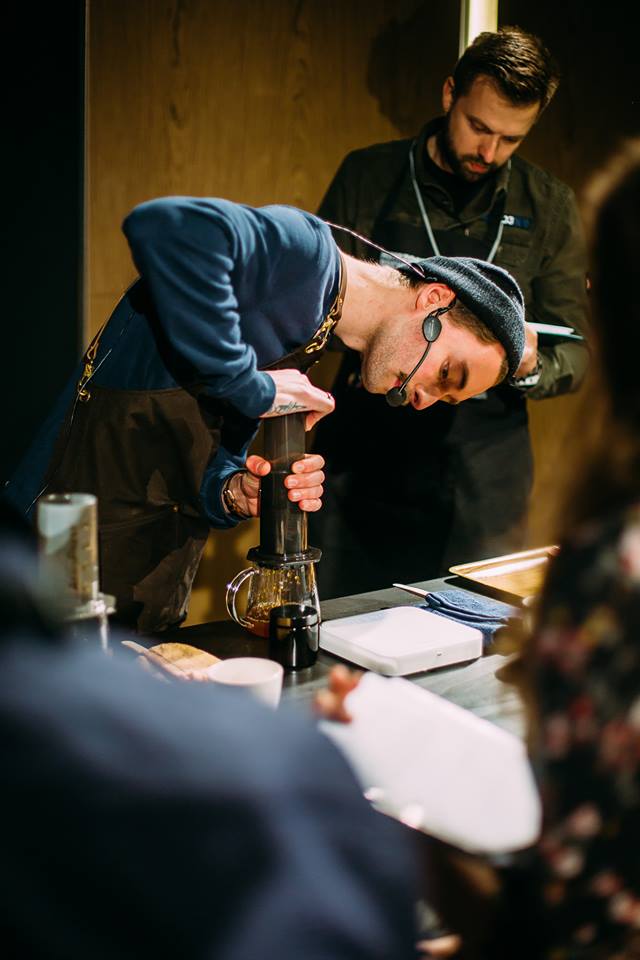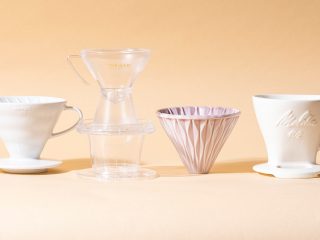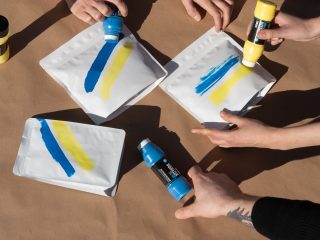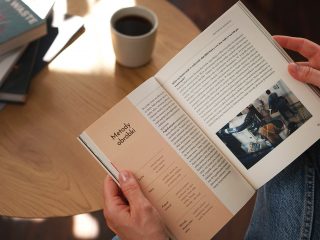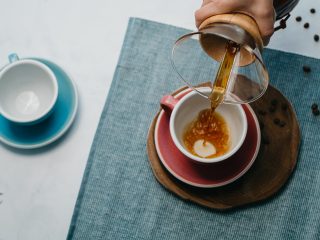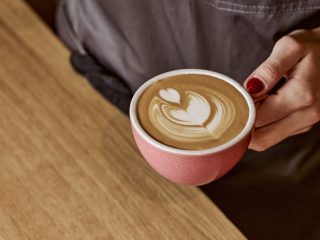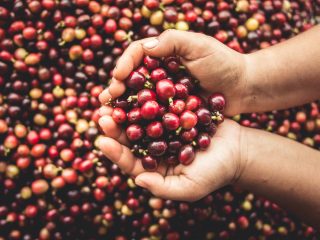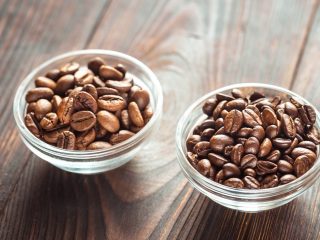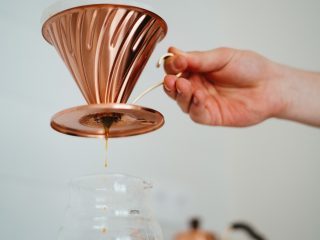Roasting coffee is both their job and passion. Little mysterious, less accessible and absorbed in a very precise work of turning best greens into best browns. I’ve managed to bring some of them out from behind the machine. Shook off from ashes and scrubbed from soot they got rid of dungarees and enrobed in casuals to answer a set of questions.
There is a chance you often sip a coffee brewed from their beans. Ladies and gentlemen, seven polish roasters from some top Polish and European roasteries share their stories!
Wojtek Rzytki – Coffeelab
He used to work in many different Warsaw coffee shops. Met many amazing people in the meantime. Wojtek has been working for Coffeelab for more than two years now. Currently he’s a head roaster of at the same company.
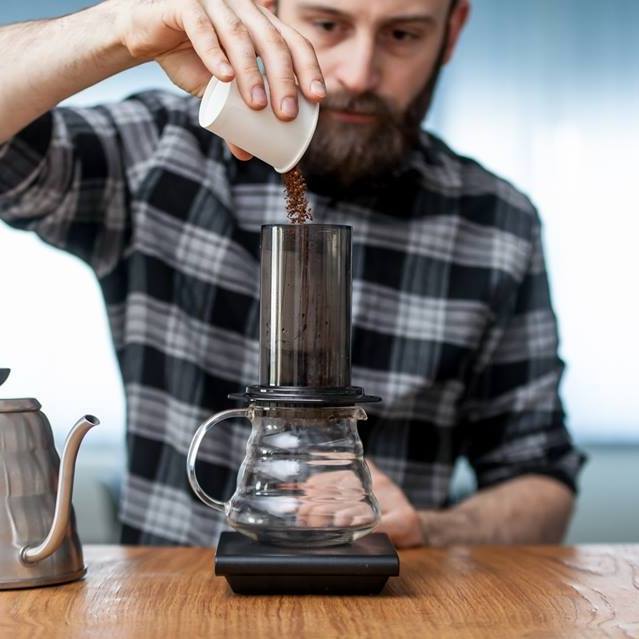
Piotr Jeżewski: How did you become a coffee roaster? Was it your goal or maybe you had never thought about becoming one before?
Wojciech Rzytki: I’ve always wanted to work in a roastery. I could even mop the floor just so to be around, learn and observe. It is the position I was eager to explore.
PJ: Do you smoke?
WR: Nope. I hate the smell of tobacco.
PJ: What’s your favorite origin? (to roast AND to drink – pick up one of each)
WR: I like Kenyans. Also, as much as it’s hard to believe, I enjoy some decafs. A well made decaf Ethiopian can taste like a good beer!
PJ: What is your sense of humor? (examples are more than welcome ☺ )
WR: I like black humor and also lame, groaner jokes.
PJ: Do you have a role model? Are you inspired by someone in terms of work and roasting style?
WR: No, I don’t. I guess every roaster has his or her own style. Like baristas have different styles of making coffee.
PJ: What’s your favorite roastery except the one you work at?
WR: I’d say Koppi is my favorite.
PJ: Is there anything you don’t like about roasting job?
WR: The only thing I don’t like about roasting is the kind of manual labor included.
PJ: There’s a permanent, worldwide absence of either espressos or filter coffee starting today. What’s your choice?
WR: Perhaps I’m just falling into many people’s disfavor, but espresso out. I drink filter coffee every single day. I can’t imagine my world without it.
PJ: Except of coffee you’re mostly fascinated about the sensory of…
WR: …beer. Beer is similar to coffee to some extent.
Damian Durda – roasting consultant
A well known joker in the industry. As a roaster he started at Bonanza from Berlin. He was providing consultancy projects to companies like %Arabica, Caffenation or Refinery. Known for his warmness, passion, dedication, love for celerity tie-ins and water pumps as well as fast and risky bike rides through downtown.
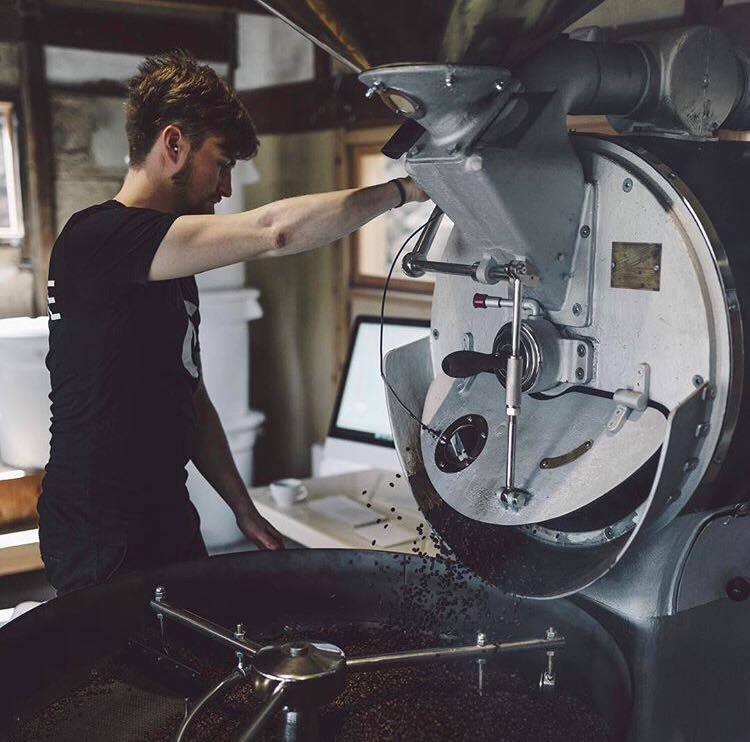
Damian Durda: I was never good at math or chemistry but roasting coffee seemed really interesting to me. I’ve decided to go deep at some point. I love the smell of roasting and the way how color changes. Eventually, I want to explore everything that is connected to coffee. Mostly the soil on which it grows. Roasting coffee is a link that makes my goal more real.
PJ: Do you smoke?
DD: No.
PJ: What’s your favorite origin? (to roast AND to drink)
DD: Honduras to roast. Kenyan and Colombian to drink.
PJ: What is your sense of humor? (examples are more than welcome ☺ )
DD: Dumb, groaner jokes. Especially “your mom” ones.
PJ: Do you have a role model? Are you inspired by someone in terms of work and roasting style?
DD: Audun Sorbotten, Scott Rao, Bjornar Hafslund, Ryan O’Donovan, Tim Wendelboe, Willie Yliluoma, Mans Akne, Mike Piccolo, Per Nordby, Zoltan Kis, Charles Nystrand, Christian Gullbrandsson, Błażej Stempin.
PJ: What’s your favourite roastery except the one you work at?
DD: Verve Coffee, Counter Culture, Tim Wendelboe, Audun Coffee, Koppi, 49th Parallel, Solberg&Hansen, Heart, Coffee Collective, Kaffa, Friedhats.
PJ: Is there anything you don’t like about roasting job?
DD: Noise, random people and weather changes.
PJ: There’s a permanent, worldwide absence of either espressos or filter coffee starting today. What’s your choice?
DD: Espresso.
PJ: Except of coffee you’re mostly fascinated about the sensory of…
DD: …honey.
Mikołaj Panasik – Czarna Fala
Another hugely experienced coffee guy. Two-time Polish Cup Tasters Champion. World Cup Tasters quarter-finalist. Currently Mikołaj works as a head roaster at Warsaw micro roastery, Czarna Fala. Known for his charming ambiguity, nuanced wit and anti-celebrity nature.
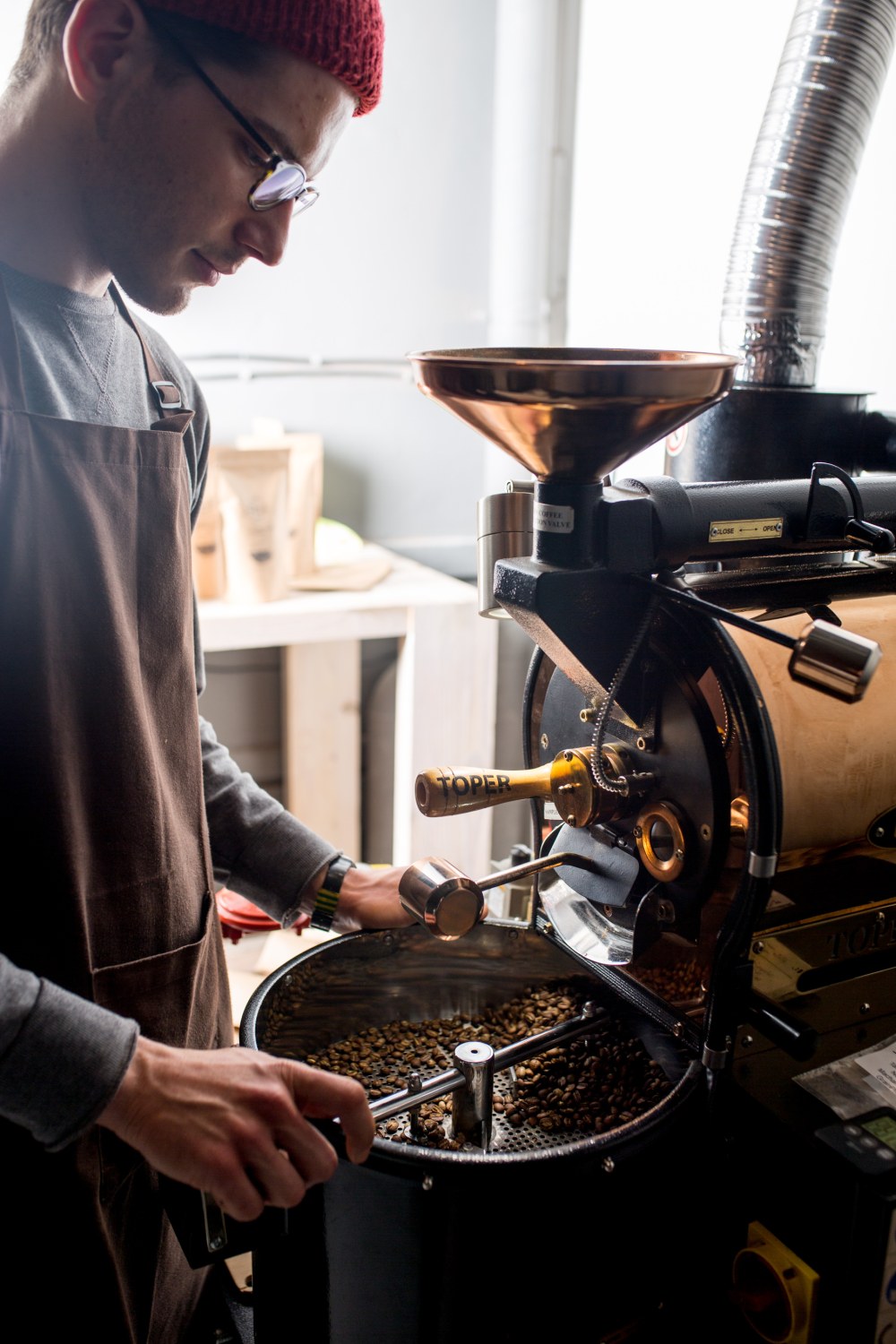
Piotr Jeżewski: How did you become a coffee roaster? Was it your goal or maybe you had never thought about becoming one before?
Mikołaj Panasik: As soon as I stopped dreaming about becoming a fireman, I wanted to be a roaster.
PJ: Do you smoke?
MP: No.
PJ: What’s your favorite origin?
MP: I had the best fun roasting Peru so far.
PJ: What’s your sense of humor? (examples are more than welcome)
MP: Lol.
PJ: Do you have a role model? Are you inspired by someone in terms of work and roasting style?
MP: I guess every roaster has some features, knowledge or skills that are inspiring. I value the craft of colleagues from the West and also how Scandinavian roasters respect the ethos of labor.
PJ: What’s your favorite roastery except the one you work at?
MP: The one that is yet about to be set up in Silesia, southern Poland.
PJ: Is there anything you don’t like about roasting job?
DD: The end of the gas.
PJ: There’s a permanent, worldwide absence of either espressos or filter coffee starting today. What’s your choice?
MP: No, I just don’t want to live in such world…
PJ: Except of coffee you’re mostly fascinated about the sensory of…
MP: …general stuff.
Rafał Kaniewski – Java Coffee Company
A coffee dinosaur. Speaking in a friendly manner, obviously! A barista, a coffee shop manager, a roaster. Currently Rafał is a head roaster at Java Coffee Company in Warsaw, one of the first specialty roasters in Poland.
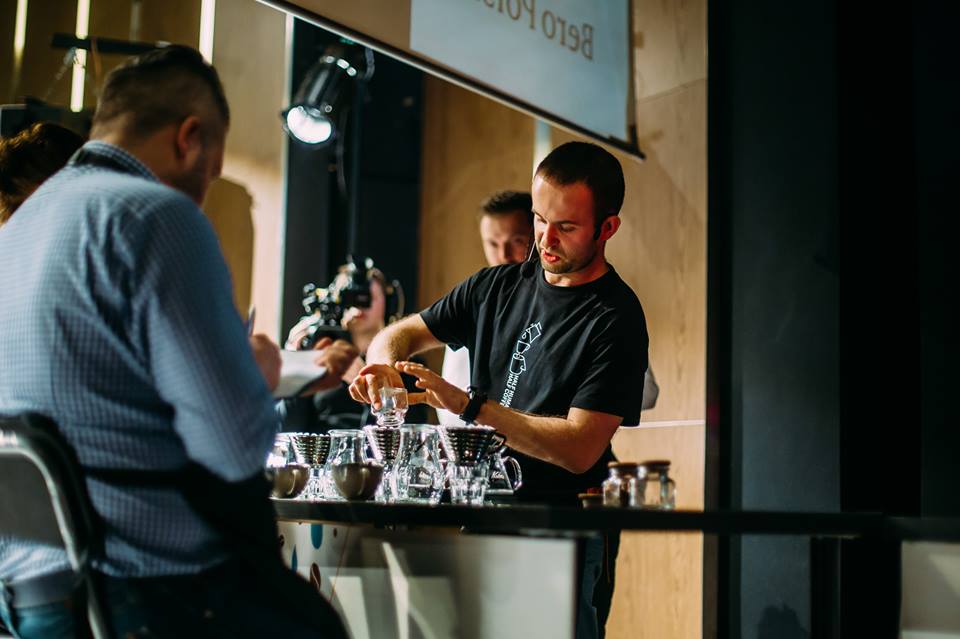
Rafał Kaniewski: It was my goal, but like many things in life – it came out of the blue!
PJ: Do you smoke?
RK: Nope.
PJ: What’s your favorite origin? (to roast AND to drink – pick up one of each)
RK: I love African coffees in general, but to be more specific let’s say Kenyans are my favorite. To drink and to roast.
PJ: What is your sense of humor? (examples are more than welcome)
RK: I don’t have a sense of humor at all…
PJ: Do you have a role model? Are you inspired by somebody in terms of work and roasting?
RK: That would be Joanna Alm from Drop Coffee.
PJ: What’s your favorite roastery except the one you work at?
RK: Drop Coffee from Stockholm and Coffee Proficiency from Poland.
PJ: Is there anything you don’t like about roasting job?
RK: When there’s not enough work for the roaster.
PJ: There’s a permanent, worldwide absence of either espressos or filter coffee starting today. What’s your choice?
RK:Espresso. Drip coffee is my favorite, no doubt about that.
PJ: Except of coffee you’re mostly fascinated about the sensory of…
RK: …wine.
Audun Sorbotten – Audun Coffee
Roasting coffee since 2006. He gained most of his experience working for one of the best roasteries in the world – Solberg&Hansen from Oslo. An author of Nordic Roaster 2011 and 2012 winning profiles. A World Roasting Champion in 2015. Currently lives in Bydgoszcz, Poland with his wife and kids and runs his own successful micro roastery.
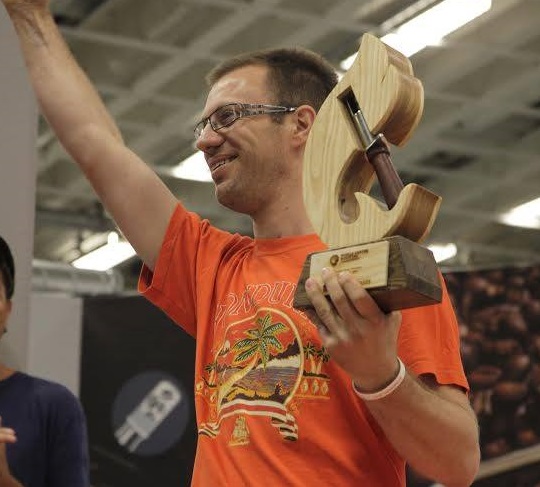
Audun Sorbotten: I was a chemist with 6 years of education and a few years in research, but I felt that I needed to work with something I was truly interested in. I discovered coffee at the age of 27, when being a student in Bergen. Good coffee, as served in the Dromedar cafes, made me feel really good. I became a home barista and I also followed Tim Wendelboe to Trieste where he became the World Barista Champion. When the research money eventually ran out I started to apply for coffee jobs. I was lucky to get a job as a coffee roaster at Solberg&Hansen in 2006.
PJ: Do you smoke?
AS: Nope.
PJ: What’s your favorite origin? (to roast and to drink)
AS: Honduras, if I should mention just one.
PJ: What is your sense of humor? (examples are more than welcome)
AS: Since it‘s hard to describe my own humor I will say that British humor is the best for me.
PJ: Do you have a role model? Are you inspired by somebody in terms of work and roasting style?
AS: No, I dont idolize anyone, but there are some people whom I listen to every time they say something about coffee or the industry: Tim Wendelboe, James Hoffmann, Peter Giuliano, Trish Rothgeb.
PJ: What’s your favorite roastery except the one you work at?
AS: When I cup blind (which I do often): Da Matteo from Gothenburg. But I really like the roast styles and coffee selection of Tim Wendelboe, Solberg&Hansen and Five Elephant.
PJ: Is there anything you don’t like about roasting job?
AS: Well, not really. Of course, there are no perfect jobs in the world, but roasting is a very, very good job. I even like doing the maintenance of my machine.
PJ: There’s a permanent, worldwide absence of either espressos or filter coffee starting today. What’s your choice?
AS: Haha! I could live very well without espresso.
PJ: Except of coffee you’re mostly fascinated about the sensory of…
AS: …age developed spirits – rum, calvados, whisky.
Wojtek Białczak – Five Elephant
He has started his coffee journey at one of the Warsaw’s most known coffee shops, Ministerstwo Kawy. Caring about his progress he then moved to Berlin and started to work for The Barn. The next step in his professional career was becoming a roaster at Five Elephant. I’m a dad and a husband. Then a roaster – he emphasizes. In the meantime, he became a Polish Barista vice-champion in 2017.
Piotr Jeżewski: How did you become a coffee roaster? Was it your goal or maybe you had never thought about becoming one before?
Wojciech Białczak: I was looking for a Berlin-based job that would let me to develop. But I didn’t want to work behind the bar. I’ve spent two years at The Barn being responsible for trainings and machinery maintenance: water systems, espresso machines and roasting machines. Therefore, a roasting job appeared to be the best choice. I got the position at Five Elephant. It turned out to be pretty demanding since they had been in need for an independent roaster. At the beginning I was pretty stressed but now, from the perspective, I consider it as a huge chance to find out my own preferences and style. So I was lucky in a way. I’m aware of the long journey ahead of me and I’m open to criticism though.
PJ: Do you smoke?
WB: No I don’t.
PJ: What’s your favorite origin? (to roast and to drink)
WB: I don’t feel I’m experienced enough to elaborate freely, but I guess I’m able to bring out desired flavors from Kenyan coffees. And I enjoy drinking Ethiopians the most.
PJ: What is your sense of humor? (examples are more than welcome)
WB: I like dorky humor, but I won’t give examples. Most of the readers would simply consider me as a lowbrow.
PJ: Do you have a role model? Are you inspired by somebody in terms of work and roasting style?
WB: I haven’t worked with many roasters, so that’s a tough one. When talking about roasting style, I’m always happy to check out the whole offer of the roastery, instead of their 2 or 3 best beans. It’s also important how they buy greens – do they think long term or focus only on the present? I like many roasteries and try to merge their nicest features into our own style.
PJ: What’s your favorite roastery except the one you work at?
WB: There are many but I like Koppi the most. I try to get a constant feedback from them.
PJ: Is there anything you don’t like about roasting job?
WB: Sure. It’s dirty. Having a shower is the first thing I’m thinking of just after work.
PJ: There’s a permanent, worldwide absence of either espressos or filter coffee starting today. What’s your choice?
WB: I’d rather have a very good espresso than a very good filter. It’s so much harder to get the first one though. Espresso – I choose you.
PJ: Except of coffee you’re mostly fascinated about the sensory of…
WB: …beer.
Błażej Stempin – Koppi
Błażej is a coffee globtrotter. He has started to work with specialty in Poland, then worked for London’s Kaffeine. Then the time has come for the roasting job at The Barn. Finally, he went north to settle in Copenhagen. But actually he doesn’t work there! He works for Koppi in Helsinborg, Sweden. Which means he spends his time in two countries nearly everyday.
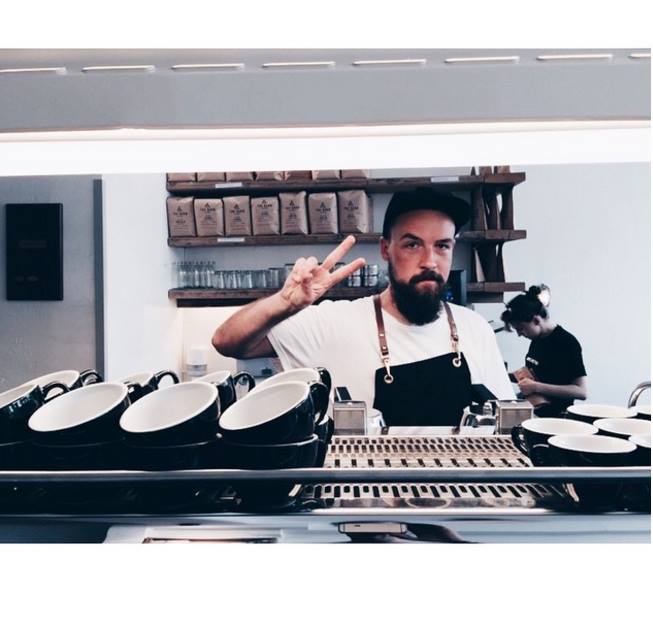
Piotr Jeżewski: How did you become a coffee roaster? Was it your goal or maybe you had never thought about becoming one before?
Błażej Stempin: It was my goal. Cooked up 6 years ago. Realized 3 years ago.
PJ: Do you smoke?
BS: No.
PJ: What’s your favorite origin? (to roast and to drink)
BS: Roasting – Kenyan. Drinking – Bolivian (I still haven’t a chance to roast it by the way)
PJ: What is your sense of humor? (examples are more than welcome)
BS: “Hi, I’m Miłosz and today I will tell you why the aeropress coffee is disappointing. Because Chemex is better. [pause] It’s a joke.” – Miłosz Strojkowski, Polish Brewers Cup 2013
PJ: Do you have a role model? Are you inspired by somebody in terms of work and roasting style?
BS: I like the style and the path that was taken by Heart from Portland.
PJ: What’s your favorite roastery except the one you work at?
BS: As above.
PJ: Is there anything you don’t like about roasting job?
BS: When green’s deliveries are delayed.
PJ: There’s a permanent, worldwide absence of either espressos or filter coffee starting today. What’s your choice?
BS: Espresso out.
PJ: Except of coffee you’re mostly fascinated about the sensory of…
BS: …wine, spontaneously fermented beer, bread, seasonal veggies and fruits, herbs.


